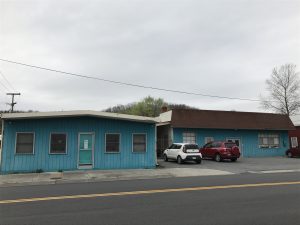By Sutton Travis
For more than 45 years, the Rockbridge Area Occupational Center was a place where people with disabilities could come together to work in a communal environment.
Now, RAOC is getting a new look – for both its services and its building. The center began changing its services on March 30.
Operations are now on hold, but Executive Director Willy Funkhouser says the halt in services is temporary.
“I think the one thing that we’re trying to get clear is that we’re not closing,” Funkhouser said. “The intent is that we’ll actually be able to support more people than we did in the past.”
RAOC formerly functioned in a sheltered workshop format. The clients, adults with disabilities, earned wages while working within the center in Buena Vista.
After the transition, RAOC will shift to providing supported employment in the community and day services for clients at its Buena Vista location. The center is expected to reopen in its new capacity in early July.
Funkhouser says the shift in services accommodates different types of clients.
“We wanted to go to this new model of employment,” he said, “but we also wanted to offer a service to those people who said they might not be ready for this new model of employment quite yet.”

RAOC’s supported employment program will help clients interested in working in the Rockbridge community to find job placements. Six of the center’s clients have expressed interest in the program.
Each client in the jobs program will complete an assessment and then be matched with a job coach. The job coaches will be responsible for helping clients decide which jobs they might be interested in. Possible jobs include waiting tables, stocking shelves in a grocery store or working as a receptionist.
Job coaches would work with selected businesses to secure a position for the clients, then help them acclimate to the working environment. As clients become more independent, Funkhouser said, the job coaches would rarely or no longer be needed.
He said supported employment will better integrate clients into the Rockbridge community.
“The goal is to offer them the same opportunities that everybody else has. It’s the personal feelings; it’s the interaction with other people, the socialization of it.”
Brooke Peccie, a senior at Washington and Lee University, has volunteered with RAOC for nearly three years. She has mixed feelings about the organization’s transition.
“Some of them at RAOC are extremely excited about going into the community and working in an integrated environment, and I am so happy for those individuals,” Peccie said. “But I am worried for the future and for the happiness of those who aren’t able to do that work.”
That’s where the day services program comes in. Clients uninterested in or unable to meet the demands of employment will be able to return to the RAOC facility. The building is undergoing renovations to fit the Department of Social Services’ regulations for such programs.
But Peccie has reservations about this new program. She recalled a conversation with an RAOC client after learning about the coming change to day services.
“She looked at me, and she kind of whispered, ‘Day care, not for children, but for us,’” Peccie said. “That just really struck me, because obviously the word ‘day care’ is a little bit demeaning.”
In its sheltered workshop format before the transition, RAOC directly employed about 30 clients by subcontracting work from local businesses. Clients earned wages for work like repackaging and sorting items, manufacturing wire harnesses and making clay jewelry.
Funkhouser said RAOC became dependent on two businesses for subcontracting. One closed, and the other relocated to a different part of the country.
“Ninety percent of our income left us,” he said.
RAOC’s board of directors made the decision to stop workshop operations after an outside consulting company failed to help the organization secure more subcontracting work.
W&L sophomore Ella Rose volunteered at RAOC during the past semester. She is concerned about clients who will be returning to RAOC for the new day services program without the prospect of earning wages.
“Supported employment maybe won’t be best for everyone, and so then they’re coming back to a place where they don’t have anything to contribute,” Rose said.
Rose hopes to bring community interaction to the day services program by spearheading social activities. Her idea is based on a similar program for which she volunteered near her hometown, Chapel Hill, North Carolina.
“They get to make friends that aren’t paid to be with them and just be accepted into a broader community,” Rose said. “It’s the highlight of these people’s weeks.”
Maia Browning, chair of RAOC’s board of directors, said in an email that participation from student volunteers would be appreciated.
“Any input as to activities, programs or ways that service or social organizations and/or individual students would see themselves helping achieve our mission are most welcome,” Browning said.
Rose plans to incorporate her fellow W&L students into the social activities program, as well as students from Virginia Military Institute and Southern Virginia University.
Drawing from her own experiences and her current role as a Young Life leader, Rose hopes to further the level of community involvement by also bringing high school students into the program.
“I think start with building a core group of people that are able to experience the joys of hanging out with people with disabilities and see that as something that’s refreshing and life-giving,” Rose said. “I feel like the most important part of it is just having a community for people with disabilities to have friends.”
